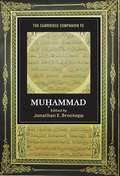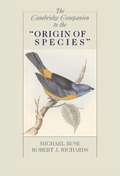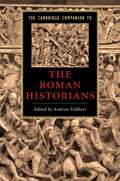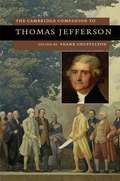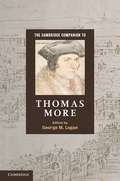- Table View
- List View
The Cambridge Companion to Martin Luther
by Donald K. MckimMartin Luther (1483â "1546) stands as one of the giant figures in history. His activities, writings, and legacy have had a huge effect on the western world. This Cambridge Companion provides an accessible introduction to Martin Luther for students of theology and history and for others interested in the life, work and thought of the first great Protestant reformer. The book contains eighteen chapters by an international array of major Luther scholars. Historians and theologians join here to present a full picture of Luther's contexts, the major themes in his writings, and the ways in which his ideas spread and have continuing importance today. Each chapter serves as a guide to its topic and provides further reading for additional study. The Companion will assist those with little or no background in Luther studies, while teachers and Luther specialists will find this accessible volume an invaluable aid to their work.
The Cambridge Companion to Mary Wollstonecraft
by Claudia L. JohnsonOnce viewed solely in relation to the history of feminism, Mary Wollstonecraft is now recognised as a writer of formidable talent across a range of genres, including journalism, letters and travel writing, and is increasingly understood as an heir to eighteenth-century literary and political traditions as well as a forebear of romanticism. The Cambridge Companion to Mary Wollstonecraft, first published in 2002, addresses all aspects of Wollstonecraft's momentous and tragically brief career. The diverse and searching essays commissioned for this volume do justice to Wollstonecraft's pivotal importance in her own time and since, paying attention not only to A Vindication of the Rights of Woman, but also to the full range of her work across disciplinary boundaries separating philosophy, letters, education, advice, politics, history, religion, sexuality, and feminism itself. A chronology and bibliography offer further essential information for scholars and students of this remarkable writer.
The Cambridge Companion to Modern Jewish Philosophy
by Michael L. Morgan Peter Eli Gordon"The Cambridge Companion to Modern Jewish Philosophy is a collection of original essays that examine the work of some of the most important Jewish thinkers of the modern era - the period extending from the seventeenth century to the late twentieth century. "--BOOK JACKET.
The Cambridge Companion to Monteverdi
by John Whenham Richard WistreichClaudio Monteverdi is one of the most important figures of 'early' music, a composer whose music speaks powerfully and directly to modern audiences. This 2007 book provides an authoritative treatment of Monteverdi and his music, complementing Paolo Fabbri's standard biography of the composer. Written by leading specialists in the field, it is aimed at students, performers and music-lovers in general and adds significantly to our understanding of Monteverdi's music, his life, and the contexts in which he worked. Chapters offering overviews of his output of sacred, secular and dramatic music are complemented by 'intermedi', in which contributors examine individual works, or sections of works in detail. The book draws extensively on Monteverdi's letters and includes a select discography/videography and a complete list of Monteverdi's works together with an index of first lines and titles.
The Cambridge Companion to Muhammad
by Jonathan E. BrockoppAs the Messenger of God, Muhammad stands at the heart of the Islamic religion, revered by Muslims throughout the world. The Cambridge Companion to Muhammad comprises a collection of essays by some of the most accomplished scholars in the field exploring the life and legacy of the Prophet. The book is divided into three sections, the first charting his biography and the milieu into which he was born, the revelation of the Qur'Äun, and his role within the early Muslim community. The second part assesses his legacy as a law-maker, philosopher, and politician and, finally, in the third part, chapters examine how Muhammad has been remembered across history in biography, prose, poetry, and, most recently, in film and fiction. Essays are written to engage and inform students, teachers, and readers coming to the subject for the first time. They will come away with a deeper appreciation of the breadth of the Islamic tradition, of the centrality of the role of the Prophet in that tradition, and, indeed, of what it means to be a Muslim today.
The Cambridge Companion to Nelson Mandela
by Rita BarnardNelson Mandela is one of the most revered figures of our time. His legacy, however, is not uncontested: his decision to embark on an armed struggle in the 1960s, his solitary talks with apartheid officials in the 1980s and the economic policies adopted during his presidency still spark intense debate. The essays in this Companion, written by experts in history, anthropology, jurisprudence, cinema, literature and visual studies, address these and other issues. They examine how Mandela became the icon he is today and consider the meanings and uses of his internationally recognizable image. Their overarching concerns include Mandela's relation to 'tradition' and 'modernity', the impact of his most famous public performances, the oscillation between Africanist and non-racial positions in South Africa, and the politics of gender and national sentiment. The volume concludes with a meditation on Mandela's legacy in the twenty-first century and a detailed guide to further reading.
The Cambridge Companion to Newton
by I. Bernard Cohen George E. SmithSir Isaac Newton (1642-1727) was one of the greatest scientists of all time, a thinker of extraordinary range and creativity who has left enduring legacies in mathematics and the natural sciences. In this volume a team of distinguished contributors examine all the main aspects of Newton's thought, including not only his approach to space, time, mechanics, and universal gravity in his Principia, his research in optics, and his contributions to mathematics, but also his more clandestine investigations into alchemy, theology, and prophecy, which have sometimes been overshadowed by his mathematical and scientific interests.
The Cambridge Companion to Newton
by Rob Iliffe Smith George E.Sir Isaac Newton (1642–1727) was one of the greatest scientists of all time, a thinker of extraordinary range and creativity who has left enduring legacies in mathematics and physics. While most famous for his Principia, his work on light and colour, and his discovery of the calculus, Newton devoted much more time to research in chemistry and alchemy, and to studying prophecy, church history and ancient chronology. This new edition of The Cambridge Companion to Newton provides authoritative introductions to these further dimensions of his endeavours as well as to many aspects of his physics. It includes a revised bibliography, a new introduction and six new chapters: three updating previous chapters on Newton's mathematics, his chemistry and alchemy and the reception of his religious views; and three entirely new, on his religion, his ancient chronology and the treatment of continuous and discontinuous forces in his second law of motion.
The Cambridge Companion to Philip Roth
by Timothy ParrishFrom the moment that his debut book, Goodbye, Columbus (1959), won him the National Book Award, Philip Roth has been among the most influential and controversial writers of our age. Now the author of more than twenty novels, numerous stories, two memoirs, and two books of literary criticism, Roth has used his writing to continually reinvent himself and in doing so to remake the American literary landscape. This Companion provides the most comprehensive introduction to his works and thought in a collection of newly commissioned essays from distinguished scholars. Beginning with the urgency of Roth's early fiction and extending to the vitality of his most recent novels, these essays trace Roth's artistic engagement with questions about ethnic identity, postmodernism, Israel, the Holocaust, sexuality, and the human psyche itself. With its chronology and guide to further reading, this Companion will be essential for new and returning Roth readers, students and scholars.
The Cambridge Companion to Primo Levi
by Robert S. C. GordonPrimo Levi (1919-1987) was the author of a rich body of work, including memoirs and reflections on Auschwitz, poetry, science fiction, historical fiction and essays. In particular, his lucid and direct accounts of his time at Auschwitz, begun immediately after liberation in 1945 and sustained until weeks before his suicide in 1987, has made him one of the most admired of all Holocaust writer-survivors and one of the best guides we have for the interrogation of that horrific event. But there is also more to Levi than the voice of the witness. He has increasingly come to be recognised as one of the major literary voices of the twentieth century. This Companion brings together leading specialists on Levi and scholars in the fields of Holocaust studies, Italian literature and language, and literature and science, to offer a stimulating introduction to all aspects of the work of this extraordinary writer.
The Cambridge Companion to Ravel
by Deborah MawerThis companion provides a comprehensive introduction to the life, music and compositional aesthetic of French composer Maurice Ravel (1875-1937). Leading international scholars offer a powerful reassessment of this most private and elusive musician, examining his work in detail within its cultural context. Marking the 125th anniversary of Ravel's birth, the volume explores the full range of his work--piano repertory, chamber works, orchestral music, ballets, songs and operas--and concludes by analyzing the performance and reception of his music, including previously untranslated reviews.
The Cambridge Companion to Sam Shepard
by Matthew RoudanéFew American playwrights have exerted as much influence on the contemporary stage as Sam Shepard. His plays are performed on and off Broadway and in all the major regional American theatres. They are also widely performed and studied in Europe, particularly in Britain, Germany and France, finding both a popular and scholarly audience. In this collection of seventeen original essays, American and European authors from different professional and academic backgrounds explore the various aspects of Shepard's career - his plays, poetry, music, fiction, acting, directing and film work. The volume covers the major plays, including Curse of the Starving Class, Buried Child, and True West, as well as other lesser known but vitally important works. A thorough chronology of Shepard's life and career, together with biographical chapters, a note from the legendary Joseph Chaikin, and an interview with the playwright, give a fascinating first-hand account of an exuberant and experimental personality.
The Cambridge Companion to Shakespeare
by Margreta De Grazia Stanley WellsWritten by a team of leading international scholars, this Companion is designed to illuminate Shakespeare's works through discussion of the key topics of Shakespeare studies. Twenty-one essays provide lively and authoritative approaches to recent scholarship and criticism for readers keen to expand their knowledge and appreciation of Shakespeare. The book contains stimulating chapters on traditional topics such as Shakespeare's biography and the transmission of his texts. Individual readings of the plays are given in the context of genre as well as through the cultural and historical perspectives of race, sexuality and gender, and politics and religion. Essays on performance survey the latest digital media as well as stage and film. Throughout the volume, contributors discuss Shakespeare in a global as well as a national context, a dramatist with a long and constantly mutating history of reception and performance.
The Cambridge Companion to Socrates
by Donald R. MorrisonThe Cambridge Companion to Socrates is a collection of essays providing a comprehensive guide to Socrates, the most famous Greek philosopher. Because Socrates himself wrote nothing, our evidence comes from the writings of his friends (above all Plato), his enemies, and later writers. Socrates is thus a literary figure as well as a historical person. Both aspects of Socrates' legacy are covered in this volume. Socrates' character is full of paradox, and so are his philosophical views. These paradoxes have led to deep differences in scholars' interpretations of Socrates and his thought. Mirroring this wide range of thought about Socrates, this volume's contributors are unusually diverse in their background and perspective. The essays in this volume were authored by classical philologists, philosophers and historians from Germany, Francophone Canada, Britain and the United States, and they represent a range of interpretive and philosophical traditions.
The Cambridge Companion to St Paul
by James D. G. DunnThe apostle Paul has been justifiably described as the first and greatest Christian theologian. His letters were among the earliest documents to be included in the New Testament and, as such, they shaped Christian thinking from the beginning. As a missionary, theologian and pastor Paul's own wrestling with theological and ethical questions of his day is paradigmatic for Christian theology, not least for Christianity's own identity and continuing relationship with Judaism. The Cambridge Companion to St Paul provides an important assessment of this apostle and a fresh appreciation of his continuing significance today. With eighteen chapters written by a team of leading international specialists on Paul, the Companion provides a sympathetic and critical overview of the apostle, covering his life and work, his letters and his theology. The volume will provide an invaluable starting point and helpful cross check for subsequent studies.
The Cambridge Companion to Stravinsky
by Jonathan CrossContains a wide range of essays reflecting the breadth of Stravinsky's musical achievement.
The Cambridge Companion to the Actress
by Maggie B. Gale John StokesThis Companion brings together sixteen new essays which examine, from various perspectives, the social and cultural role of the actress throughout history and across continents. Each essay focuses on a particular stage in her development, for example professionalism in the seventeenth century; the emergence of the actress/critic during the Romantic period and, later on, of the actress as best selling autobiographer; the coming of the drama schools which led to today's emphasis on the actress as a highly-trained working woman. Chapters consider the image of the actress as a courtesan, as a 'muse', as a representative of the 'ordinary' housewife, and as a political activist. The collection also contains essays on forms, genres and traditions - on cross dressing, solo performance, racial constraints, and recent Shakespeare - as well as on the actress in early photography and on film. Its unique range will fascinate, surprise and instruct theatre-goers and students alike.
The Cambridge Companion to the Age of Attila
by Michael MaasThis book examines the age of Attila, roughly the fifth century CE, an era in which western Eurasia experienced significant geopolitical and cultural changes. The Roman Empire collapsed in western Europe, replaced by new 'barbarian' kingdoms, but it continued in Christian Byzantine guise in the eastern Mediterranean. New states and peoples changed the face of northern Europe, while in Iran, the Sasanian Empire developed new theories of power and government. At the same time, the great Eurasian steppe became a permanent presence in the European world. This book treats Attila, the notorious king of the Huns, as both an agent of change and a symbol of the wreck of the old world order.
The Cambridge Companion to the "Origin of Species"
by Michael Ruse Robert J. RichardsThe Origin of Species by Charles Darwin is universally recognised as one of the most important science books ever written. The Origin of Species is also a work of great cultural and religious significance, in that Darwin maintained that all organisms, including humans, are part of a natural process of growth from simple forms. This Companion commemorates the 150th anniversary of the publication of the Origin of Species and examines its main arguments. Drawing on the expertise of leading authorities in the field, it also provides the contexts - religious, social, political, literary, and philosophical - in which the Origin was composed. Written in a clear and friendly yet authoritative manner, this volume will be essential reading for both scholars and students More broadly, it will appeal to general readers who want to learn more about one of the most important and controversial books of modern times.
The Cambridge Companion to the Roman Historians
by Andrew FeldherrNo field of Latin literature has been more transformed over the last couple of decades than that of the Roman historians. Narratology, a new receptiveness to intertextuality, and a re-thinking of the relationship between literature and its political contexts have ensured that the works of historians such as Livy, Sallust, and Tacitus will be read as texts with the same interest and sophistication as they are used as sources. In this 2009 book, topics central to the entire tradition, such as conceptions of time, characterization, and depictions of politics and the gods, are treated synoptically, while other essays highlight the works of less familiar historians, such as Curtius Rufus and Ammianus Marcellinus. A final section focuses on the rich reception history of Roman historiography, from the ancient Greek historians of Rome to the twentieth century. An appendix offers a chronological list of the ancient historians of Rome.
The Cambridge Companion to Thomas Jefferson
by Frank ShuffeltonThis Companion forms an accessible introduction to the life and work of Thomas Jefferson, third President of the United States and author of the Declaration of Independence. Essays explore Jefferson's political thought, his policies towards Native Americans, his attitude to race and slavery, as well as his interests in science, architecture, religion and education. Contributors include leading literary scholars and historians; the essays offer up to date overviews of his many interests, his friendships and his legacy. Together, they reveal his importance in the cultural and political life of early America. At the same time these original essays speak to abiding modern concerns about American culture and Jefferson's place in it. This Companion will be essential reading for students and scholars of Jefferson, and is designed for use by students of American literature and American history.
The Cambridge Companion to Thomas More
by George M. LoganThis Companion offers a comprehensive introduction to the life and work of a major figure of the modern world. Combining breadth of coverage with depth, the book opens with essays on More's family, early life and education, his literary humanism, virtuoso rhetoric, illustrious public career and ferocious opposition to emergent Protestantism, and his fall from power, incarceration, trial and execution. These chapters are followed by in-depth studies of five of More's major works - Utopia, The History of King Richard the Third, A Dialogue Concerning Heresies, A Dialogue of Comfort against Tribulation and De Tristitia Christi - and a final essay on the varied responses to the man and his writings in his own and subsequent centuries. The volume provides an accessible overview of this fascinating figure to students and other interested readers, whilst also presenting, and in many areas extending, the most important modern scholarship on him.
The Cambridge Companion to Vaughan Williams
by Alain Frogley Aidan J. ThomsonAn icon of British national identity and one of the most widely performed twentieth-century composers, Ralph Vaughan Williams has been misunderstood as much as he had been revered; his international impact and enduring influence on areas as diverse as church music, film scores and popular music has been insufficiently appreciated. This volume brings together a team of leading scholars, examining all areas of the composer's output from new perspectives, and re-evaluating the cultural politics of his lifelong advocacy for the music-making of ordinary people. Surveys of major genres are complemented by chapters exploring such topics as the composer's relationship with the BBC and his studies with Ravel; uniquely, the book also includes specially commissioned interviews with major living composers Peter Maxwell Davies, Piers Hellawell, Nicola Lefanu and Anthony Payne. The Companion is a vital resource for all those interested in this pivotal figure of modern music.
The Cambridge Companion to Verdi
by Scott L. BalthazarThis 2004 Companion provides a biographical, theatrical and social-cultural background for Verdi's music, examines in detail important general aspects of its style and method of composing, and synthesizes stylistic themes in discussions of representative works. Aspects of Verdi's milieu, style, creative process and critical reception are explored in essays by highly reputed specialists. Individual chapters address themes in Verdi's life, his role in transforming the theater business, and his relationship to Italian Romanticism and the Risorgimento. Chapters on four operas representative of the different stages of Verdi's career, Ernani, Rigoletto, Don Carlos and Otello synthesize analytical themes introduced in the more general chapters and illustrate the richness of Verdi's creativity. The Companion also includes chapters on Verdi's non-operatic songs and other music, his creative process, and scholarly writing about Verdi from the nineteenth-century to the present day.
The Cambridge Companion to Vygotsky
by Harry Daniels Michael Cole James V. WertschL. S. Vygotsky was an early-twentieth-century Russian social theorist whose writing exerts a significant influence on the development of social theory in the early-twenty-first century. His non-deterministic, non-reductionist account of the formation of mind provides current theoretical developments with a broadly drawn yet very powerful sketch of the ways in which humans shape and are shaped by social, cultural, and historical conditions. This dialectical conception of development insists on the importance of genetic or developmental analysis at several levels. The Cambridge Companion to Vygotsky is a comprehensive 2007 text that provides students, academics, and practitioners with a critical perspective on Vygotsky and his work.

